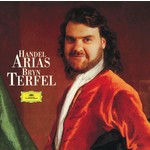
MARBECKS COLLECTABLE: Handel: Opera and Oratorio Arias (Judas Maccabaeus, Dettingen Te Deum, Serse +)
 $25.00
In Stock
add to cart
$25.00
In Stock
add to cart
GEORG FRIDERIC HANDEL
MARBECKS COLLECTABLE: Handel: Opera and Oratorio Arias (Judas Maccabaeus, Dettingen Te Deum, Serse +)
Bryn Terfel (baritone) / Scottish Chamber Orchestra, Sir Charles Mackerras
[ Deutsche Grammophon / CD ]
Release Date: Monday 19 June 2000
""I feel", sings Terfel with assurance in his voice matching the solemnly, expectantly, ceremonious opening bars; and then, the second time, "I feel", but now with the awed conviction of one who has experienced "the Deity within". The adjustment, the change of expression, is small, and no doubt when described sounds obvious enough; but it is typical of the touch which Terfel brings, essentially that of an imaginative intelligence, for generally it does not occur to basses who are about to sing "Arm, arm, ye brave!" that there might be a point in the repetition of those opening words and in the specific development of the recitative. "Israel's distressful prayer" and the Lord's "gracious ear" are reflected in a softening and sweetening of the voice, which then gains strength with the decisive emphasis of "set the captive free" and the excitement of "lead us on to victory". Comparing recordings, one hears authority in early versions, something more mystical in recent ones, but never such alertness as in Terfel: he is the most awake of singers.
And what of his singing, his voice-production, his care for legato? As to the latter, conflict always lurks as expressive emphasis, shading and verbal naturalism assert their rights in the face of pure beauty and the evenness of the singing-line. Terfel is one in whom the rival claims work their way to a compromise, though if one side has to win it will generally be the expressive element. A good example of the compromise is the second track, the "Vouchsafe, o Lord", quietly and simply sung, preserving the movement's unity and yet with a power of feeling that, at "let thy mercy lighten upon us", is as overtly emotional as an operatic aria. "Honour and arms" and "O, ruddier than the cherry" combine evenness and clear articulation of the semiquaver runs, creating an awareness of character (both braggarts and in varying degrees absurd) while maintaining the grace and dignity that are also characteristic. The adapted arias, "Where'er you walk", "Verdi prati" and "Ombra mai fu", justify their inclusion readily enough, and it is good to hear Terfel again in the solos from Messiah.
The singing here incorporates a good deal of embellishment, some of it of Sir Charles Mackerras's devising. He is an excellent conductor for Terfel, sharing with him an appreciation of the zest in Handel. The Scottish Chamber Orchestra appear to share it too, and the recording, though made in the resonant Usher Hall, is vivid and clean."
Gramophone
Tracks:
I feel the Deity within - Arm, arm ye brave
Vouchsafe, O Lord
Honour and arms
Si, tra i ceppi
Verdi prati, selve amene
O voi, del mio poter... Sorge infausta una procella
I rage, I melt, I burn... O ruddier than the cherry
Where'er you walk
Revenge, Timotheus cries
Va tacito e nascosto
Ombra mai fù
Thus saith the Lord of Hosts... But who may abide
Why do the nations
Behold, I tell you a mystery... The trumpet shall sound
